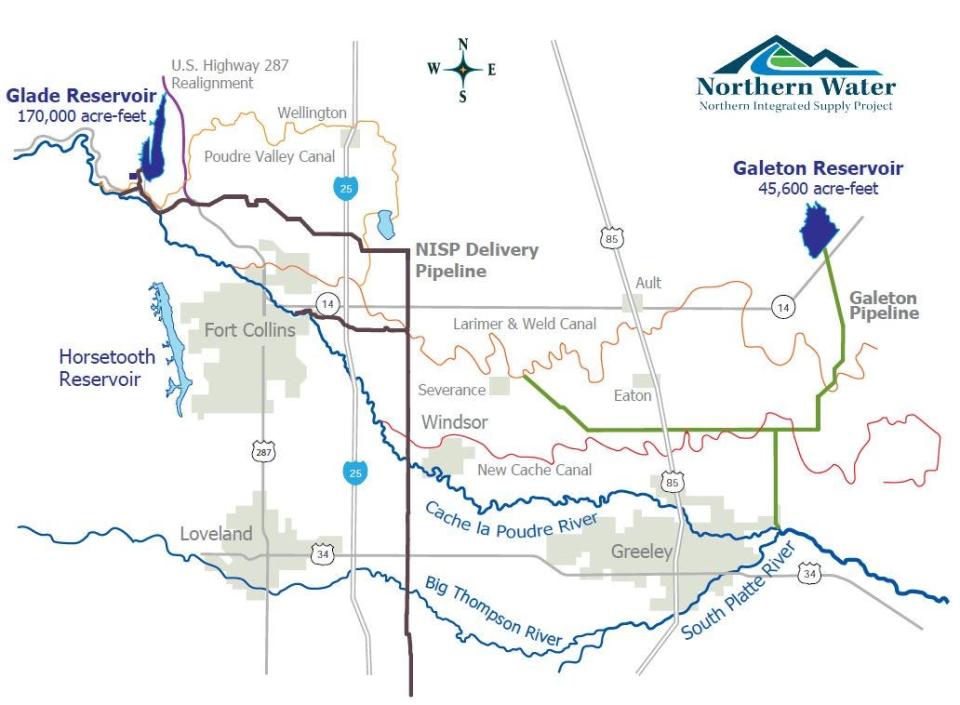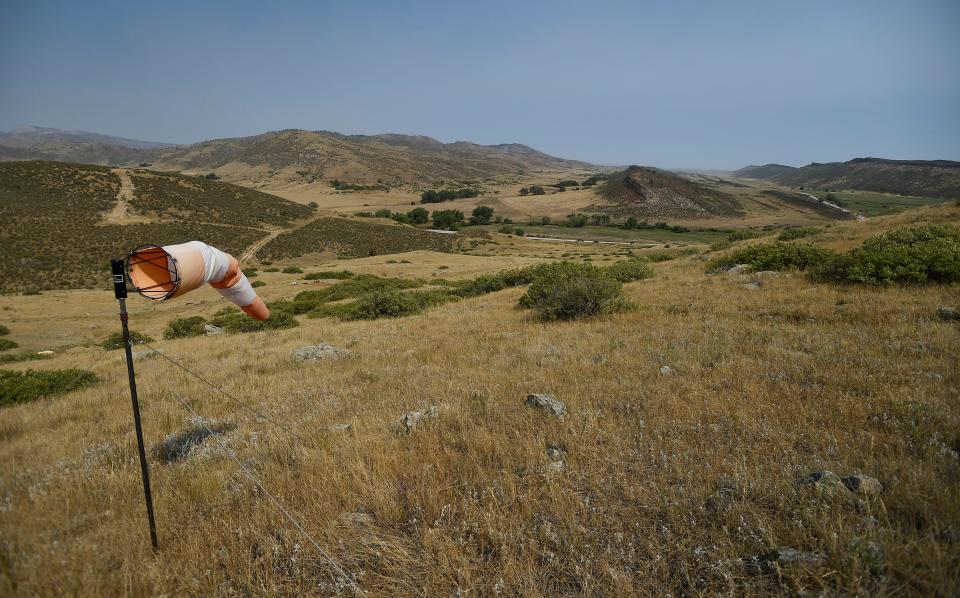NISP won federal permit to proceed. Here's what it means for the $2 billion water project
A Northern Colorado regional water project cleared a major hurdle last week after receiving a long-awaited federal permit allowing the project to move forward.
The planned $2 billion Northern Integrated Supply Project received a federal Clean Water Act Section 404 Record of Decision from the U.S. Army Corps of Engineers on Friday, Northern Water Conservancy District — the group leading the project — announced in a news release, calling this “a major milestone” for the project.
This is the final large-scale permit needed for the project to move forward, Northern Water spokesperson Jeff Stahla told the Coloradoan.
“This action is the culmination of nearly 20 years of study, project design and refinement to develop water resources well into the 21st century,” Northern Water General Manager Brad Wind said in the news release. “This Project will also allow participating communities to serve their customers without targeting water now used on the region’s farms.”
Subscribers:Reroute of U.S. 287 for new reservoir puts highway in front of residents' driveways
NISP will divert water from the Poudre and South Platte rivers to store in two new reservoirs — Glade Reservoir north of Fort Collins and the smaller Galeton Reservoir east of Ault — to supply water for 15 growing North Front Range communities and water suppliers, including the Fort Collins-Loveland Water District and others in Weld and Boulder counties.

What's next for NISP?
Northern Water is still in the design phase for NISP, and Stahla said construction could begin in late 2024 or early 2025 and should be operational four years after that, based on the timeline for the Chimney Hollow Reservoir.
Summer work at the future Glade Reservoir site, including soil sampling, was helpful in the design process, Stahla said. Continued work on the project's design and working with project participants to identify funding sources will be Northern Water's focus in the near future.
The Fort Collins City Council is undergoing a process to create 1041 regulations that would regulate the development of major water or sewer pipelines and transportation facilities, which would include a portion of NISP that runs through city limits.
The city council is scheduled to consider adopting these regulations in February, and depending on their decision, NISP may be required to undergo a review and permitting process through the city, city planning manager Rebecca Everette told the Coloradoan.
Previous:Summer work begins at Glade Reservoir as NISP awaits federal permit

What went into the federal permit process
The nearly 20-year-long permit process included various environmental impact studies and public hearings, which helped refine the project to mitigate some of its potential impacts. The biggest refinement is the decision to send about a third of the water from NISP down the Poudre River through the city of Fort Collins annually, regardless of how full Glad Reservoir is, Stahla said.
That means a flow rate of up to 25 cubic feet per second in the summer and 18 cubic feet per second in the winter, Stahla said. The city saw a flow rate of 10 cubic feet per second in Whitewater Park in downtown Fort Collins over Labor Day weekend, Stahla said.
The additional flow would expand recreation opportunities at Whitewater Park and support the ecosystem for fish, insects and plants in the river, Stahla said. Glade Reservoir will also provide recreation opportunities, taking some of the pressure off Horsetooth Reservoir.
"Our permit reflects the comprehensive alternatives analysis required by (National Environmental Policy Act)," Stahla said. "State-of-the-art science went into the development of NISP, and we stand behind that."
Where will Fort Collins' water come from? That depends on what residents value.
Opposition to NISP persists
The project continues to face opposition. Save the Poudre Executive Director Gary Wockner said the group and its supporters will continue to take legal action against what they call a "river-destroying project," and are preparing to sue over the recent federal permit approval.
"We've given the Northern Colorado Water Conservancy District every chance to find a compromise solution, but instead they've chosen to compromise the Cache la Poudre River," Wockner said in a news release.
Wockner said in his statement that Save the Poudre is open to talks with Northern Water, but the group plans to sue over the Army Corps of Engineer's decision to approve the project.
"The vast majority of people in Fort Collins want the Poudre River not just protected, but increasingly restored. Our supporters have given us our marching orders to do just that," Wockner said in a email. "NISP would further drain and destroy the Poudre through Fort Collins, and so we will fight this permit in court as long as possible. At the same time, we will continue to communicate with Northern Water to seek a solution that meets all of needs, not just the narrow interests of water suppliers."
Opponents say NISP would irreparably damage the Poudre River, taking more than 40,000 acre-feet of water each year at buildout and robbing the river of the annual “June rise” event when flushing flows clear out the stream channel. The projected annual diversions represent about 13% of the Poudre River's average annual flows at the canyon mouth.
Several opposing groups have filed multiple lawsuits in an effort to block aspects of the project and have been vocal in their opposition of the project, including Save the Poudre, No Pipe Dream and Save Rural NoCo.
A lawsuit filed by Save the Poudre against the Larimer County commissioners for granting a county permit for NISP is ongoing and is expected to be decided in 2023, Wockner said.
Residents north of Fort Collins who who will be impacted by the U.S. Highway 287 realignment to construct Glade Reservoir have been outspoken against the plans for the highway placement and its impact on their properties. Stahla said Northern Water is working with the residents impacted to mitigate issues and finalizing the highway's reroute design.
This article originally appeared on Fort Collins Coloradoan: NISP granted federal permit for water project in Northern Colorado

